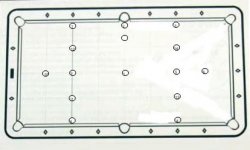sorry for the REAL crappy layout, but i can't use WEI at work.
This drill has everything that i need in a 9ball game.
play balls in order.
1 ball: learning: bridging over 2 for the 1 in the lowermidle corner.
2 ball: learning: draw the CB one diamond back to get an angle on the 3 and potting (i try to put the CB back where it all started) the 2 in the uppermiddle corner
3 ball: learning: switching sides, depending on how far the cb is, the speed will vary, and depending on the speed, the tips of ouside english will vary too to get high ebough above the 4 but there is Danger to scratch too in the lower middle pocket. potting 3 in the upper right corner. (HERE i only use one rail aka the upperrail)
4 ball: learning: switching sides the 4 in the lowerright cornerbut here the speed is the keyfactor. I try to get the speed exactly right so the cb ends as close to the rail as possible, and as close to the 2 as possible. (i dont have too, i just play it this way as i often find that i need to put the cb 1 rail right against the rail. for the 5 in the lowerright corner, . I need to have an angle to pot the 5 and go low on the 6. If my cb isnt close to the cussion, i often have to use throw and inside english to pot the 5 and still get an angle on the 6. the closer to the rail i am, the straighter the 5 ball is. ((HERE i only use one rail aka the lowerrail)
5 ball: learning: slowrole straight in shot or slow inside english. (i try to barely shoot it hard enough to pocket it = speed controle)
6 ball: pot the 6 in right uppercorner, learning speedcontrol to stop the CB back in middle of table for the 6.
7 ball: pot in upper left corner (same learning as 3ball= sideswitch, as depending on the positing of the cb, you will always have to use different tipofsets.
8 ball

ot in lower left corner (same learning as 3ball= sideswitch, as depending on the positing of the cb, you will always have to use different tipofsets. as close to where the 2 was)
9, 10 same as 5 6
11 ball+12 ball: alternating side pocketing but here i dont use the upper or lowerrail, but i use the left rail to go 2 rails; leave an angle on the 12 to go 2 rail to other side of the table for the 13
13 + 14 ball alternating sides pocketingbut i dont use the upper or lowerrail, but i use the right rail to go 2 rails
Gives me a drill with all my problems.
bridging, precise draw shots, switching side with various angles and speeds), speed of the table, 2 rail positioning cross table, alternating pockets 1 rail or 2 rails (upper and lower) or 2 rails (side + upper/lower ).
I'm 99% sure no one will understand what i'm saying, but without WEI its close to impossible. There are MANY ways to run this in rotation, but i always try to run it this way, as this gives me the best combo drill. I usually do this drill 20 times, and count down how far i got. and then average out. Usually i miss after 6 or 7 balls on average. so i have 6/20. My goal is to get 15/20.
when i come home from work: 20 times this drill, 30 minuts of stroke checking, 20 times this drill, 30 minuts of 9ball.
perfect preparation for a 9ball tournament. (hardest shots are getting the cb close to the rail after potting the 3 or 4 and not scratching, not touching the 13,14 after potting the 6) and getting the speed right on most of the shots.
im trying to find a way to include clusters....

 I'll have to find 10 guys for a group lesson up here in Canada, maybe you'll spend a few hours with me privately then for free
I'll have to find 10 guys for a group lesson up here in Canada, maybe you'll spend a few hours with me privately then for free  Also waiting for the banking system with SAM
Also waiting for the banking system with SAM 
